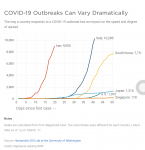Here's the graph I posted earlier, showing the how much lower the rate of spread had been in Singapore and Japan (Hong Kong is not shown) where widespread early testing was done, combined with assiduous contact tracing - as opposed to countries where this was not done, such as Iran and Italy.
View attachment 951
Remember, Singapore and Japan were two of the very first countries to report cases - partly because they were testing for it from the very outset. Then they took effective measures to contain it through contact tracing. Other countries didn't start testing until people started showing up in hospital in serious condition by which time it was too late - the virus was already widespread in the community.
South Korea does present as a slight anomaly according to the graph but that seems to be because they've been testing much, much more widely than any other country (so far, 1 in 200 of the population has been tested) and are turning up correspondingly larger numbers of people with either mild or no symptoms. However, probably because of that, the fatality rate in South Korea is one of the lowest in the world at 0.7% as opposed to the global average of 3.4%.


